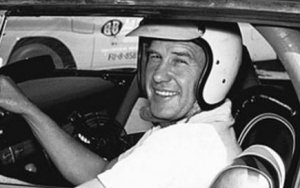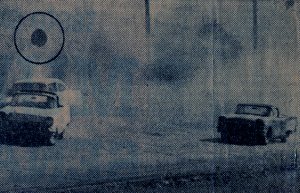The King’s Near Miss

NASCAR pioneer Lee Petty was never one for losing. That was never more apparant than in the Grand National series’ final event at Lakewood Speedway.
It was a dusty, frustrating day for race officials.
With 40 cars on the track, the 150-mile Grand National event at Lakewood Speedway promised to be something to remember.
It was almost remembered for being a disaster.
Qualifying was cancelled because it would have been impossible to have gotten time trials for all 40 cars before the scheduled start time, so the line-up was determined by a draw.
NASCAR was furious. The Southeastern Fair Association, who still controlled Lakewood, fined race promoters Carl Queen and Ernie Troutman $100 for the late start.
Once the race got started, the dusty, dangerous conditions of the worn out racing surface reared its head again. Twice the race was stopped to allow water to the track. It did little to help, as the track surface had the consistency of baby powder after all the years of hard racing.
To top it all off, the track’s ancient water truck broke down, and had to be towed. The fire truck on hand was used to water down the track, delaying the restart of the race as the fire crew filled the truck with water again.
Despite all the trouble, the drivers still put on a whale of a show.

Ken Rush has trouble at Lakewood when he loses a tire (circled) in turn one.
Ken Rush had one of the most memorable moments of the event, losing a wheel in the first turn and plowing into the guardrail.
As the race wound down, it proved to be another race in which Lakewood would have the last laugh.
Fireball Roberts led late, piloting a Paul McDuffie wrenched Chevy. Roberts’ bid for the win ended when he was caught up in a wreck with Marietta’s Gene White and Harlan Richardson of Texas.

This rare photo shows Richard Petty just moments after taking the checkered flag at Lakewood. Petty is standing in his convertible Oldsmobile, wiping the dirt from his face.
That put Atlanta’s own Jack Smith out front by a safe margin. But when his engine blew with six laps to go, officials and scorers scrambled.
Young Richard Petty had started 27th, calmly working his way through the field and the mayhem. Now, with just five laps remaining, he found himself in the lead. With the crowd of 15,000 cheering, Richard took the checkered flag for what appeared to be his first victory in his NASCAR career.
“I’m so nervous, I can’t write” Petty was reported to have said when someone asked for his autograph shortly after climbing from his pop-top ’57 Oldsmobile.
But while son Richard was enjoying victory lane, father Lee Petty was raising hell with the NASCAR officials. After starting 37th, he too had taken care of his equipment, and worked his way up into contention.
When the checkered flag flew, Lee was credited with fourth place, one lap down. He immediately demanded a re-check of the lap count, insisting the leader had not passed him all day.
Officials determined that Lee had been shorted one lap in error by a scorer. Richard’s car was pushed out of victory lane, and Lee was declared the winner.
“I knew I won,” Lee told the local papers at the time. “I’m sorry Richard had to lose this way, but I don’t want him to win on a mistake.”
Years later, Lee would add that NASCAR paid a $500 bonus to any driver winning in a new car. He was piloting a 1959 Plymouth that day, while Richard was driving a two-year-old Oldsmobile.
By what he did, he said, he earned the team $500 more than they would have gotten otherwise. But the real truth is that Lee Petty just flat didn’t like to lose.
For his part, the local papers reported that Richard took the loss with grace. That was a trait that would be a large part of making him “The King” of stock car racing years later.
Regardless, NASCAR left Lakewood with a bang. The story of the lost win between father and son continues to be one of the most told stories of stock car lore in history.
